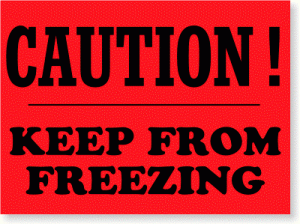Now that winter has finally arrived, and temperatures are dropping fast, it is not difficult to see how the cold weather may impact some epoxy floor coating shipments. Adverse winter weather conditions can cause freight delays, often causing material shipments to be stuck over the weekend at a freight terminal. Additionally, holidays can affect transit times, causing freight to sit idle out in a cold semi trailer. These scenarios are all too real this time of year.
When it comes to epoxy floor coating products, it is important to be aware that some of these products need to be protected from freezing. Cold, or frozen, flooring material can wreak havoc on a project, possibly causing project delays and affecting flooring performance and aesthetics.
Protect From Freezing
For polymer floor coating products, it is crucial to avoid the potential for frozen material. Typically, a flooring contractor is working on a strict timeline, and for polymer floor coating materials to be correctly installed, they must first be tempered to the recommended application temperature, which is typically common room temperature. In colder months, it is good practice to schedule flooring material to deliver to the jobsite material staging area a day or two early, where it has the opportunity to properly temper prior to application. Installation contractors typically do not have the luxury of an extra day or two to wait for material to be properly tempered. This affects crew labor costs, and can affect the project schedule with regard to other trades, potentially derailing the project.
It is also important to understand how frozen polymer coating material can affect product performance. When epoxy resin materials freeze and crystallize, it is not as simple as tempering the material back up to above 32°F. In fact, to properly rejuvinate crystallized epoxy, it needs to be heated and stirred at a minimum temperature of 140°F. This is not possible on a typical jobsite. The project-compromising effect of material crystallization can manifest itself in crawling and dewetting of the material during installation, commonly known as “Fish-Eying”. This certainly affects installation, and results in very poor finished aesthetics, requiring field repair and recoating of the material.
Optional Freight Services
When products that are temperature-sensitive have to ship, “Protect from Freeze” services are the answer. “Protect from Freeze” is an extra service that many carriers provide to keep goods that can freeze above 32 degrees. By utilizing “Protect from Freeze” services, the material is sheltered from the cold conditions. Freight companies use a couple of different methods to keep materials from freezing which include heated trailers, and form fitting blankets.
This service is not offered by every freight company, and in cases of extreme cold, some carriers may not be able to offer a freeze protection guarantee at all. If possible, try to plan ahead, by ordering materials and having them on site several days before a project starts. Coordinating shipment to deliver by Friday, so products do not sit on a cold truck terminal over the weekend, is a wise strategy. Finally, be aware of the weather in certain shipping lanes. In many cases when the temperature drops below 15 degrees the carrier will suspend service so be prepared for delays.
Are you planning an industrial floor coating project?
Take our online Flooring Self-Assessment. You might be surprised at what you uncover about your floors
- A Faster Cure for Flooring Needs: Polyaspartics in Action - April 8, 2025
- The Case for Epoxy Mortar in Manufacturing - April 8, 2025
- Epoxy Mortar Flooring: Built for Heavy-Duty Performance - March 29, 2025




